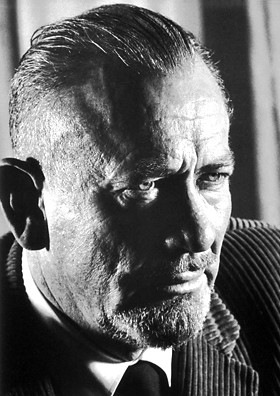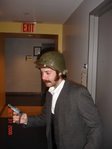 |
| My poem "Abysmal Mollusk" is up at In Between Hangovers. |
Saturday, May 21, 2016
In Between Hangovers, Part Deux
Labels:
animals,
Ben Nardolilli,
non-biography,
poetry,
web pages,
writing
Tuesday, May 17, 2016
Part Moron, Part Genius and Part Ogre: Reviewing Paris Review Interviews
As I mentioned in my last blogpost I'm getting back into the publishing game, trying to find and agent and with their help, scale the heights of the...um...publishing world. To that end I'm immersing myself in the world of writing, authors, and publishing. I'm reading articles about getting published, instructions, lists of agents, how-to manuals, all of it. Hopefully something will rub off on me. Or I will at least be inspired. The key is to make it what I do when I'm bored or when I need something to kill time. No more idle following the news, gossip, music, or movies. No, instead, I'm going to listen to an interview on Bookworm with Michael Silverblatt or watch a documentary about Hemingway, Fitzgerald, or the whole Lost Generation!
However, I save that for when I'm submitting and searching for presses and agencies. When I can't play something in the background, or watch it in the foreground, I have to turn to the text in order to continue my immersion in the affairs of the writ. It makes sense, words for a would-be up-and-coming wordsmith. A favorite of mine are the interviews at the Paris Review. They span the decades from the 1950s to the present day and contain several gems from poets, playwrights, and novelists. Reading through them, you realize how the same problems with editors, audiences, booksellers, publishers, and writer's block keep recurring through literary history and never fail to spare the famous, infamous, unknown, and rightfully ignored.
 |
| In the 1950s, a goatee like this automatically landed you on the Blacklist |
"He is so stupid you can't trust him with an idea.
He is so clever he will catch you in the least error.
He will not buy short books.
He will not buy long books.
He is part moron, part genius and part ogre.
There is some doubt as to whether he can read."
Terry Southern's interview was interesting, if for no other reason, I think I look like him with my bangs and beard. He also predicted rise of cable and movies on demand. At one point, the interviewer asks “will success spoil Terry Southern?” judging from his Wikipedia page, I’d say yes, yes it did.
Over time, the interviews slowly evolve and the interviewees change the way they write them. In Harold Bloom's piece, the interview strangely incorporates his wife and him wandering through rooms and watching television. In the end it becomes a screenplay of the time the two of them spent together. In his interview, he revealed that he liked the Band (“there hasn’t been any good American rock since, alas, The Band disbanded”), as well as his view of foreign policy ("Our foreign policy basically amounts to making the world safe for Gnosticism").
Reading the more recent pieces in the Paris Review, it seems they are becoming self-aware. Not that the subject and the interviewer suddenly know they are in the midst of a friendly interrogation. That's always been the case since the interviews started. It's more the case that the Paris Review is now dealing with writers like Matthew Weiner and Wallace Shawn who grew up reading the interviews. Wallace even believed he would end up being interviewed by the publication eventually.
Perhaps one day I'll get to make a comment about commenting on the interviews while being interviewed by the Paris Review. Meta Squared.
Labels:
biography,
books,
celebrity,
fiction,
history,
humor,
interview,
literary magazines,
literature,
memoir,
non-fiction,
observations,
podcast,
poetry,
prose,
writing,
youtube
Saturday, May 14, 2016
In Between Hangovers and Other Updates
A poem of mine "Father and Son Safari" is up at In Between Hangovers. It was inspired by a story I read about Soren Kierkegaard's childhood. His father used to walk him around a room in their Copenhagen house and they would pretend to visit a world city, say Paris. Young Soren would be asked to describe various monuments and landmarks one might see in the city while staying in the confines of the room. I guess an armchair would be Notre Dame and so on.
I've decided to begin the process of querying agents again. I took a break the last couple of years because I got discouraged. In that time I wrote several more novels, honed my skills, and rewrote my first novel "The Daybreak Boys," I changed the title from "Everything with Wings Is Restless," and gutted out the interior. It was once a series of journal entries by the narrator. Now it is just straight first person storytelling. The exterior remains: the great bromance of our age. I think it's ready for some strangers' eyes. Not just any strangers. Strangers with contacts in publishing, of course.
So, wish me luck with that. If you've been wishing me luck so far, but in regards to getting poems published on websites, you can stop. Thanks for the vibes and prayers so far, now you just need to direct them towards the world of literary agents.
Labels:
Africa,
alcohol,
animals,
Ben Nardolilli,
Children,
commuting,
experimental literature,
health,
observations,
philosophy,
poetry,
travel,
web pages,
writing
Monday, May 9, 2016
Subscribe to:
Comments (Atom)




